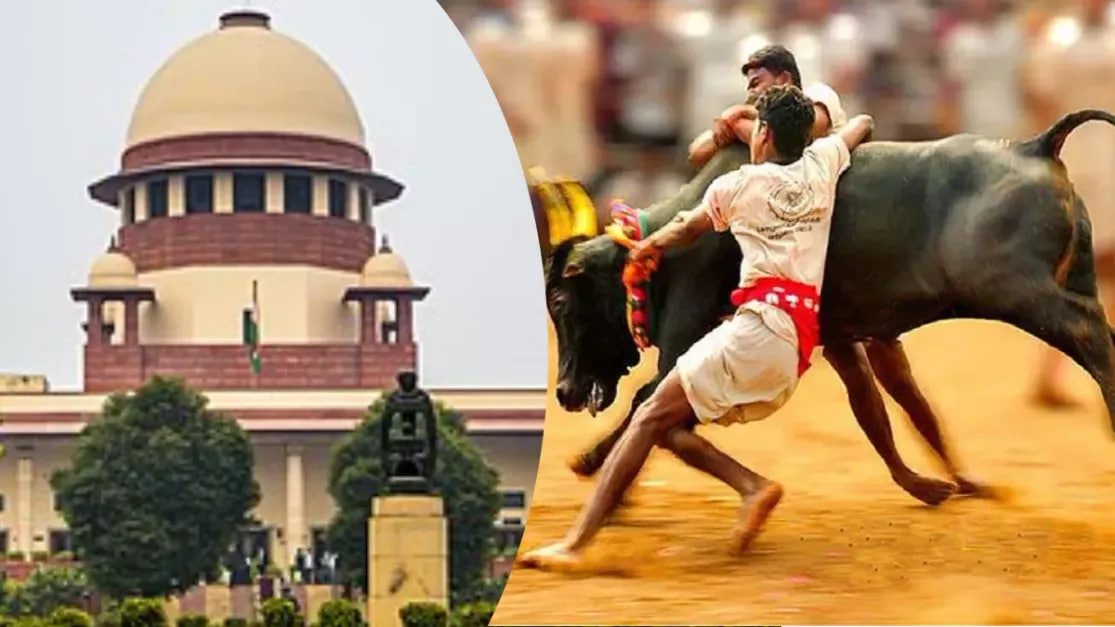Description

Copyright infringement not intended
Context: The Supreme Court of India has delivered a landmark verdict by upholding the constitutional validity of amendments made to the Prevention of Cruelty To Animals Act by Tamil Nadu, Karnataka and Maharashtra to allow cultural events such as Jallikattu, Kambala and bullock-cart racing.
Details
- These events are traditional forms of bovine sports that involve taming or racing bulls or buffaloes in different regions of the country.
Supreme Court observation
- The Court in a unanimous decision by a five-judge constitution bench has overruled its previous judgment of 2014 that had banned these sports on the grounds of cruelty to animals.
- The court observed that the amendments introduced by the three states had received presidential assent and had incorporated additional safeguards to minimise harm to the animals.
- The court noted that these sports have been practised for centuries and are part of the cultural heritage of the people.
- The court said that it was not its role to determine whether these sports are integral to the culture or not, but to examine whether they agree with the constitutional provisions and the central legislation.
- The court held that the amendments were not colourable legislation or an attempt to override its earlier judgment, but valid exercises of legislative power by the states.
- The court also directed the district authorities to ensure strict compliance with the rules and regulations governing these sports.

Reaction over the court verdict
Supporters
- The verdict has been welcomed by the supporters and participants of these sports, who had been demanding their revival for years.
- They argued that these sports are not cruel but a way of honouring and celebrating their relationship with the animals.
- They also claimed that these sports promote the rural economy and tourism.
Critics
- The verdict has also been criticised by some animal rights activists and organisations, who had challenged the amendments in the court.
- They contended that these sports are inherently cruel and cause unnecessary pain and suffering to the animals.
- They also alleged that these sports violate the fundamental duties of citizens to show compassion for animals.
Way Forward
- The Supreme Court has tried to strike a balance between preserving the cultural identity of the people and protecting the welfare of animals. The verdict has opened a new chapter in the legal and social debate on these sports, which have been a source of pride and passion for many.
- The judgement is significant as it balances the interests of animal welfare and cultural rights, and respects the legislative competence of the states to make laws on matters relating to their culture and traditions. It also sets a precedent for other cases involving similar issues of bovine sports or animal rights.
Must Read Articles:
Jallikattu and Kambala: https://www.iasgyan.in/daily-current-affairs/jallikattu-25
Prevention of Cruelty to Animals Act 1960: https://www.iasgyan.in/daily-current-affairs/prevention-of-cruelty-to-animals-act-1960
|
PRACTICE QUESTION
Q. Which of the following statements is incorrect about Jallikattu and Kambala?
1. Jallikattu is a traditional bull-taming sport practised in Tamil Nadu, while Kambala is a buffalo race held in Karnataka.
2. Jallikattu and Kambala are both ancient rituals that involve sacrificing animals to appease the gods.
3. Jallikattu and Kambala are both cultural expressions that have been recognized by UNESCO as intangible heritage.
Choose the code;
A) 1 and 2 only
B) 2 and 3 only
C) 1 and 3 only
D) 1, 2 and 3
Answer: B
Explanation:
Statement 2 is incorrect: Jallikattu and Kambala are both traditional sports that have been practised for centuries in different parts of India. They are considered symbols of bravery, valour, and rural identity by their respective communities.
Statement 3 is incorrect: UNESCO has not recognized either Jallikattu or Kambala as intangible heritage, although some other forms of bull-related sports have been included in its list.
|

https://www.downtoearth.org.in/news/governance/jallikattu-kambala-can-go-on-in-tamil-nadu-and-karnataka-rules-supreme-court-89425











